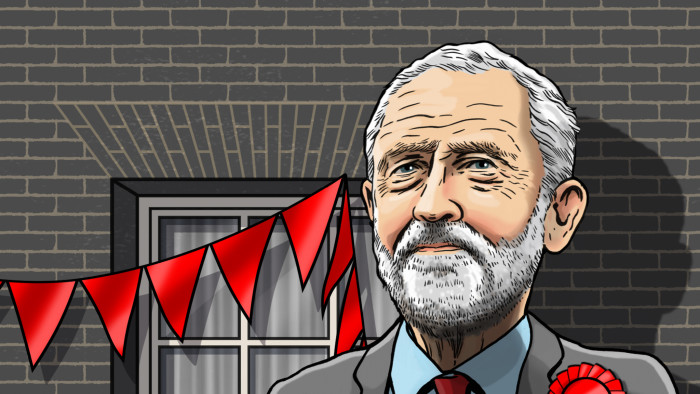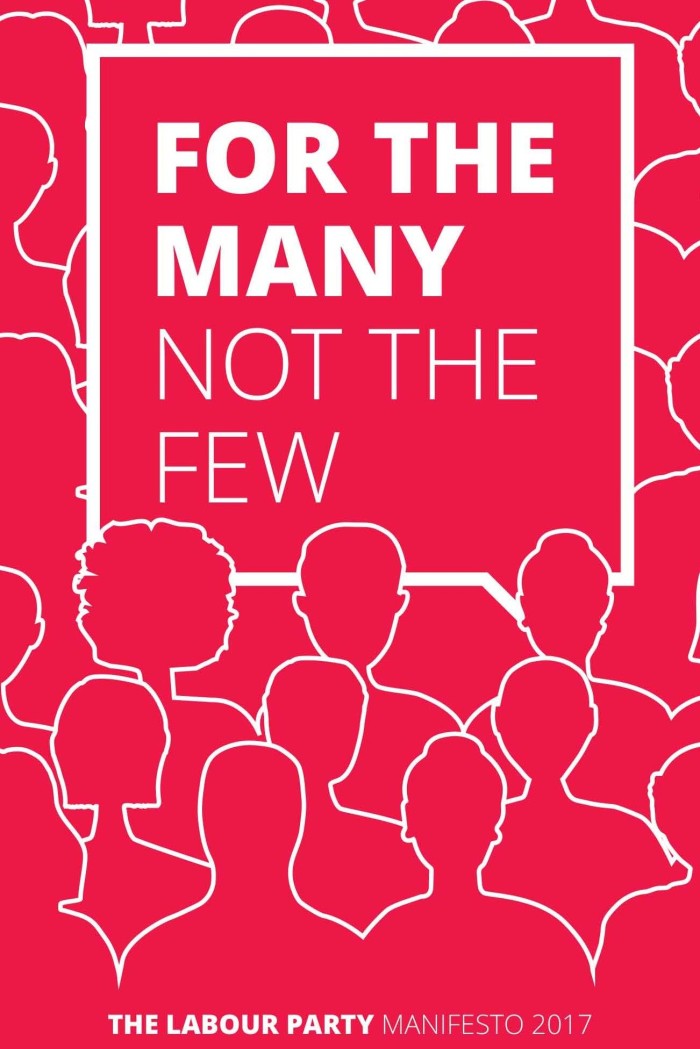How to hedge your finances against a future Corbyn government
Roula Khalaf, Editor of the FT, selects her favourite stories in this weekly newsletter.

They might be considered unlikely to vote for Jeremy Corbyn, but the rising popularity of the Labour leader is rapidly moving up the agenda in conversations between the UK’s wealthiest and their financial advisers.
In the event that he came to power, what impact might future Labour policies have on their wealth? And secondly, what financial planning measures — if any — could be considered to mitigate these?
The party’s unexpected comeback at the snap general election last June left the Conservatives without a majority, casting doubt on their ability to hang on for a full five-year term. Should a mis-step in the Brexit negotiations topple the existing administration, this could prompt a fresh election which many believe Mr Corbyn could win.
The party’s attractiveness to younger voters is rooted in the sense of hopelessness that many of the millennial generation have when it comes to their personal finances. Labour’s promises to tackle student debt, reform the “gig economy”, build thousands of affordable homes and introduce tougher regulation to protect those renting a property all have huge appeal.
“Unless we solve the UK housing crisis, we’re going to have Jeremy Corbyn as prime minister,” says Richard Buxton, one of the City’s best-known fund managers and chief executive of Old Mutual Global Investors. “Capitalism is not working for the under-40s, so they’re voting for socialism.”
Both Mr Buxton and Merryn Somerset Webb, the FT columnist, argue that it is fear of a Labour government, rather than fear of Brexit, which is depressing the valuations of domestically focused UK companies.
Labour dismissed such fears as “wild speculation” and said it did not recognise the assumptions underlying this article. But a quick scan of the party’s election manifesto will make uncomfortable reading for wealthy over-40s who have amassed assets including pensions, share portfolios and properties.
Higher taxes under Labour are a certainty — but the burden is likely to fall disproportionately on higher-income taxpayers. No new taxes were pledged in the manifesto, but advisers find it scarcely credible that Mr Corbyn, once in power, would not at some point reconsider higher taxes on wealth or property. Parties are free to introduce new ideas when in government, regardless of whether they were proposed in a manifesto.
Here, FT Money writers present the aspects of Labour policies which are concerning advisers the most and the tactics their clients are considering to protect their wealth.

The next election might be years away, but tax advisers say clients are already focusing on the tax changes that could be introduced by a Labour government.
George Bull of RSM, the accountancy firm, says the concerns are not confined to the very wealthy. “We’re not talking here solely about the very rich. Labour party statements make it clear that those earning more than £80,000 can expect to pay higher income taxes under a Labour government.”
Many will have little option but to pay more. “In the long term, there is little that can be done to reduce this burden, unless people consciously work less hard, move down the jobs ladder or emigrate,” Mr Bull says.
However, the very wealthiest are likely to find ways to circumvent increased taxes on high earners. Analysis by the Institute for Fiscal Studies, the independent think-tank, suggested that Labour’s plans to increase tax rates on the rich would raise extra revenue mostly from those with incomes between £80,000 and £200,000, rather than those with the very highest incomes.
Experts think business owners would bring forward dividends, bonuses and capital gains. “Whenever people think tax rates are going up, they accelerate income,” says Tim Stovold, partner of Kingston Smith, the accountancy firm. “If there is a Labour government, there will be a massive rush to pay out dividends before an emergency Budget.”
Investors might also choose to sell assets, in an attempt to lock in the current low rates of capital gains tax (CGT). Owners of small businesses might be concerned that “entrepreneurs’ relief” that reduces the rate of tax to just 10 per cent might be axed. As an alternative to an outright sale, company owners might sell assets to trusts to trigger the CGT charge, advisers say.
Mr Bull adds that these fears are well-founded, as Labour’s 2017 manifesto mentioned wealth taxes as one option for easing the care cost crunch.
“There is no certainty as to what people might do,” he says. “However, we hear far greater interest about lifetime tax planning — for example, gifts of assets to children being made sooner rather than later — so that parents’ asset values are reduced before a wealth tax or land value tax takes force.”
The favourable inheritance tax status of defined contribution pensions, which can currently be passed tax free to heirs in some circumstances, is something many advisers fear the current government will scrap, let alone a Labour one. Higher-rate tax relief on pensions contributions is another obvious area of vulnerability, advisers say.
The Labour party has also signalled its intention to close various loopholes and tax breaks, as well as ending “the social scourge of tax avoidance”. It has signalled that it would make public the tax returns of those earning more than £1m a year and double the number of HMRC staff investigating wealthy tax avoiders. It might also increase the insurance premium tax on private healthcare.
The rate of corporation tax would be restored to 26 per cent. In addition, a Labour government might tackle tax planning that takes advantage of the gap between income and corporate tax rates, such as the practice of holding investments within a company. One possibility is that the undistributed profits of “close” companies — those controlled by five or fewer people — could be taxed as though they had been distributed to shareholders.
Labour’s plans

The Labour party’s manifesto for the 2017 general election (PDF download)
“Let’s build a fairer Britain where no one is held back. A country where everybody is able to get on in life, to have security at work and at home, to be decently paid for the work they do, and to live their lives with the dignity they deserve” — Jeremy Corbyn, from the manifesto’s introduction.
Labour would also expand the existing UK stamp duty on shares into a broader financial transaction tax. Avinash Persaud, chair of Intelligence Capital, a financial advisory firm, is a champion of the proposed tax which would “bring strength and stability to our markets”.
He says it would not cost jobs, although critics are less sure. Dan Neidle, partner of Clifford Chance, a law firm, says it would “create a strong incentive for funds, investors and traders to migrate from the UK”.
Labour has said it wants to see the public disclosure of trusts, which it describes as “a key vehicle for tax avoidance and illicit financial flows”. The industry says HMRC already has access to this information and making it public would put beneficiaries in a vulnerable position.
Mr Stovold says people avoiding tax by using trusts would fear “trial by media”. “It would be a witch hunt,” he says. “People might want to consider unwinding those structures.”
Whatever the long-term outcome of Labour’s policies on UK stocks and bonds, the election of Jeremy Corbyn would initially be likely to push down the price of UK gilts, take a toll on domestic UK stocks and result in a slide in sterling according to investment commentators.
Shadow chancellor John McDonnell revealed last year that Labour was scenario planning for a run on the pound in the wake of a Corbyn victory. That would flatter the earnings of the FTSE 100 companies that derive their earnings overseas and hurt domestically-facing UK companies — the likes of which were punished in the aftermath of the UK’s Brexit vote.
“Very obviously domestically-facing sectors such as housebuilders and UK retail would be likely to underperform, particularly as housebuilders had a very good run in 2017,” says Tom Stevenson, investment director at Fidelity Personal Investing.
More specifically, Labour’s plans to nationalise railways, water, energy and Royal Mail would take a toll on those segments of the market. And Mr Corbyn’s aim to intervene more heavily in areas such as energy could drag on the dividends paid by those companies and investment funds.
Job Curtis, a Henderson fund manager, says: “We are already beginning to see weakness in companies involved in passenger transport and water utilities. United Utilities — a water company covering the north west of England, has experienced a large share price fall in the last year partly because of the increased likelihood of a Labour government under Corbyn.”
“Sectors including utilities and energy companies are high dividend payers and whether it’s nationalisation or increased regulation and price caps, the outlook for higher and sustainably high dividend incomes looks under threat under a Corbyn government,” says Mr Stevenson.
Labour has also pledged to bring billions of pounds worth of private finance initiative (PFI) projects back under government control. Any move to do so would hurt the popular infrastructure investment companies that invest in those and have been in high demand in recent years due to their high, inflation-linked income streams.
“PFI and renationalisation would be very bad for the listed infrastructure investment companies,” says Jason Hollands, managing director at Tilney Group. “And Labour’s plans would also mean a big expansion of debt, which would be bad news for bond markets,” he says.
“The gilt market would be most at risk [from a Labour government],” says Mr Curtis, who manages UK equity investment trust the City of London. “Bond yields are incredibly low — 10-year gilts are yielding 1.24 per cent and 30-year gilts are yielding 1.8 per cent. Public debt would balloon under a Labour government which would mean yields would significantly increase.”
According to the Institute for Fiscal Studies, borrowing would be £37bn per year higher in 2021-22 under a Labour government compared with the Conservatives. “The issue with gilts is that if you’re borrowing more, you become a higher-risk lender and it becomes more expensive to borrow,” says Adrian Lowcock, investment director at Architas.
That would not just affect the price of bonds. Until now, a number of UK companies perceived as low-risk, sustainable income payers, including stocks such as Diageo, have been buoyed as income investors have chosen them instead of low-risk bonds. An increase in bond yields would send money flowing out of those so-called “bond proxies” and back into the credit market.
Labour said the concerns identified by FT reporters were “wild speculations” and added it did not recognise the assumptions they were based on.
“Labour policy is expert led and done in consultation with business leaders and stakeholders across numerous sectors of our economy. At the last election we set out a fully costed manifesto underpinned by our fiscal credibility rule. This has been in stark contrast with a Tory government that refused to cost their manifesto, have failed to meet many of their own targets, and they still to this date have not fully costed many of their latest spending commitments,” the party said.
Labour promised a big expansion of current housebuilding rates in last year’s election manifesto, pledging to build a million homes within five years — half of which would be for council or housing association tenants. Delivering on that promise in future could help squeezed first-time buyers and low-income homebuyers in areas of high house prices and low supply.
But advisers say homeowners and aspiring buyers at the wealthier end of the spectrum are raising concerns over the prospect of higher taxes on property or the introduction of new housing levies to fund spending elsewhere. Labour has no plans to introduce a “mansion tax” on expensive property assets — a measure previously considered by the party, as well as by the Liberal Democrats.
More broadly, the mood of uncertainty hanging over the UK’s long-term economic outlook — occasioned by Brexit, the resurgence of support for Labour and wider geopolitical uncertainty — has already led some buyers of high-end property to reconsider their purchases.
Simon Gammon, managing director of mortgage broker Knight Frank Finance, says some buyers in London had decided to rent rather than buy, in the belief that house prices were unlikely to rise further under the influence of these factors and homeowners might well face higher annual taxes on their properties.
“There are examples of people agreeing longer than normal lets — three to five years rather than six months — and sitting it out. There’s a cost to that, but their perception is that it will be more than outweighed by any fall in the value of property,” he says.
Any narrowing in the prospects of a hard-left government taking power would also lead to a surge in the number of homeowners fixing their mortgage, he predicts, accelerating a trend that has been under way for several years as interest rates have fallen and more borrowers have sought to lock in low rates. “The likelihood of Jeremy Corbyn coming to power will drive more people to fixed rates because they want the certainty of knowing where they are,” he says.
Those with expensive overseas properties would face other issues under any administration committed to new forms of taxation. Mindful of the need for maintenance and upkeep, they are increasingly moving sums to a local bank in the overseas country to give peace of mind as a hedge against currency gyrations and tax uncertainty, according to Richard Bertin, a partner at family office Stonehage Fleming.
“You don’t need to be a high net worth individual to have a second home abroad,” says Mr Bertin. “If you need to think about meeting future expenditure needs on a property in France or Spain the question is how do you get the currency overseas? It could be more expensive if there’s a change of administration and issues around Brexit. At worst, it could be difficult to get money out of the country.”
Buy-to-let landlords — already under pressure from increased tax and regulation of the rental sector — are also considering how a future change of government might affect them. Advisers say some are seeking to move ahead with partial sales of a portfolio to lock in the current 28 per cent rate of capital gains tax and cement any gains made in recent years. Some have memories of previous CGT regimes, which charged the tax at the individual’s marginal income tax rate.
Henry Pryor, an independent buying agent, says the prospect of a Labour government is “frightening” for the owners of large, expensive assets. But Mr Corbyn is not the only cause of disquiet among the wealthy, he adds.
“The way the winds are blowing, homeowners have a problem whichever party is holding the reins because they’re all talking about moving from taxing income to taxing wealth.”
Reporting by Vanessa Houlder, James Pickford, Lucy Warwick-Ching, Kate Beioley, Claer Barrett and Jim Pickard
Labour’s youth vote holds up
More than two-thirds of students would vote Labour if there were a general election tomorrow, according to a new poll of full-time undergraduates by the Higher Education Policy Institute and YouthSight.
Labour’s promise to scrap tuition fees was high on the list of reasons students gave for saying they would vote for the party. However, half of them said they did not think Labour would be able to follow through with its pledge in office.
Over the past seven years, university tuition fees have trebled to more than £9,000 a year, and maintenance grants have been abolished and replaced with loans.
Labour has pledged to reintroduce maintenance grants for university students and abolish university tuition fees. However, universities fear the move could damage their finances.
“If the current tuition fee and income-contingent loan repayment system in England were to be scrapped, the gap would need to be met in full from other sources of public finance,” says a spokesman for Universities UK.
Research by the IFS claimed that scrapping the current system would benefit the wealthiest graduates the most, as the highest earners repay a greater proportion of their debts through the tax system.
“We would also need assurances that there would not be a cap on the number of student places,” said Universities UK. “If the country is to thrive, particularly in the light of Brexit, it needs more, not fewer, skilled graduates. The benefits of getting a degree remain clear for individuals and for the economy and society.”
For younger pupils, Labour has said it would roll out free meals for all primary school pupils which could be paid for by imposing VAT on private school fees.
Comments